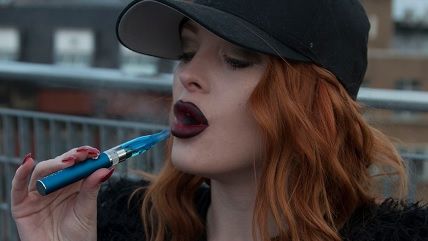Government Officials Are Determined to Turn Vapers Into Scofflaws
E-cigarettes aren't just a safer alternative to the real thing, they're an innovation people plan to use whether or not scolds approve.

It shouldn't be surprising that, even as researchers endorse the harm-reduction potential of e-cigarettes and a prominent British medical group flat-out endorses their use, government officials are doing their best to make vaping difficult and expensive, and the Food and Drug Administration (FDA) stands poised to impose what are widely expected to be burdensome regulations on the popular smoking substitute. After all, what good is a pleasurable pastime without a little taste of prohibition? Or, at least, that seems to be about as far as official "thinking" ventures.
If officials are successful in their efforts to tangle vaping in red tape, you can expect the public reaction to be as defiant as always.
For those not in the know, e-cigarettes are handheld devices that vaporize liquid for inhalation. One popular component of that liquid is nicotine, making the widgets handy stand-ins for cigarettes, and the devices can even be made to look like old-fashioned smokes. For many vapers, though, the ability to customize the appearance of e-cigarettes and to choose the flavor of the "juice" is part of the appeal.
Given that combination of personalization and nicotine delivery without actually having to set something on fire, it's no wonder that e-cigarettes are growing in popularity. The ranks of vapers doubled from 10 percent of smokers to 21 percent just from 2010 to 2011, according to the Centers for Disease Control (CDC). By 2014, e-cigarettes were more popular than traditional tobacco products among teens, University of Michigan researchers found.
That really pisses off CDC director Tom Frieden, who told the Los Angeles Times, "To me, as a physician, when 1.78 million of our high school kids have tried an e-cigarette and a lot of them are using them regularly … that's like watching someone harm hundreds of thousands of children."
Harm? Really?
Maybe, if you assume that any recreational nicotine consumption is a bad thing, and that the alternative to e-cigarette use is an ascetic lifestyle, you could make the case for "harm." But a lot of people in the know disagree. They say that vapers are likely to use e-cigarettes as an alternative to smoking traditional cigarettes, and that depriving them of their preferred pleasure is likely to drive them to actual tobacco, or to simply ignore regulators.
E-cigarettes "could reduce harm to never smokers who would have otherwise initiated long-term cigarette use, and reduce harm to current smokers by helping them to quit," write a panel of researchers headed by David T. Levy, an oncologist at Georgetown University, in a paper published last week in the journal Addiction.
Britain's Royal College of Physicians goes even further. In a report issued last week, the group, which sets standards for doctors in the UK, urged that "in the interests of public health it is important to promote the use of e-cigarettes, [nicotine replacement therapy] and other non-tobacco nicotine products as widely as possible as a substitute for smoking."
The principle here is "harm reduction," based on the recognition that people are going to do what they want to do, not what kill-joy scolds wish they'd do. Since restrictions and prohibitions won't really curb people's disfavored behavior, it's best to reduce the harm they suffer by leaving them options that have a realistic chance of minimizing the damage done.
Like letting people choose a wildly popular recent innovation that dispenses nicotine through vaporized liquid instead of the smoke from burning leaves.
As Frieden's comment above indicates, U.S. officials aren't really leaning in that direction. The FDA's proposed rules, which could officially take effect anytime, would (among other things) require that any vaping products introduced after February 15, 2007 would have to be pulled from the market and reintroduced only after working their way through an approval process established by hostile government nags.
That regulatory gauntlet is almost certain to not only inconvenience vapers, but favor large, established companies accustomed to negotiating bureaucratic mazes—such as tobacco companies.
The FDA's attitude can probably be predicted by the warnings it has been issuing about the lack of regulation (a gap it's more than willing to fill) and invitations for tales of "adverse events" with e-cigarettes.
The only thing currently standing in the way of prohibition (and crony capitalism) by regulation is an amendment to the agriculture appropriations bill that would leave vaping products subject to regulation, but would eliminate the requirement that products introduced after the magic 2007 date undergo pre-market approval.
Well, that's not the only thing standing in the way of prohibition. People's unwillingness to be bossed around also plays a big role. At the end of 2015, the Consumer Advocates for Smoke-Free Alternatives Association surveyed its membership about their potential response to a variety of scenarios, from restrictions on the availability of vaping products to total bans. From 89 percent to 93 percent responded that they'd continue "getting products and supplies (e.g., e-liquid) from overseas or the domestic black market," or make the juice for themselves (the Internet is chock full of guides and products for enthusiasts who want to brew their own concoctions).
Many others would just turn to actual tobacco, of course.
Even if the FDA is thwarted, local killjoys might make e-cigarette bootlegging a going concern anyway. Vermont is poised to adopt a 92 percent excise tax on e-cigarettes as well as tight rules on their sale and use in public. Other jurisdictions have adopted similarly restrictive policies, without regard to the positive alternative the devices offer to old-fashioned smokes.
Government scolds seem bound and determined to subject vaping to the same prohibitionist policies they've inflicted on actual tobacco products. If they do, they're guaranteed to reap the same defiance and generate a whole new type of black market.


Show Comments (63)